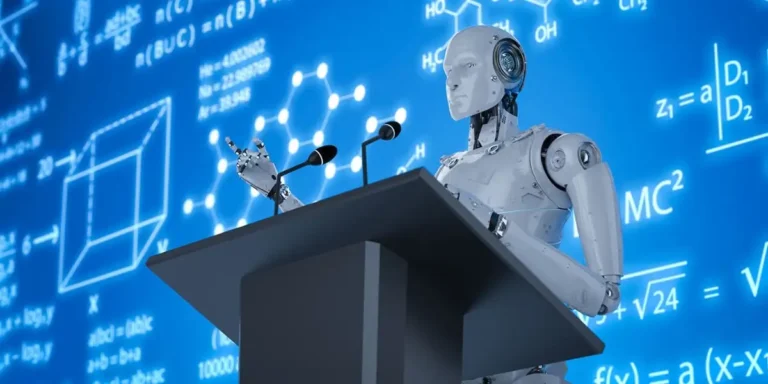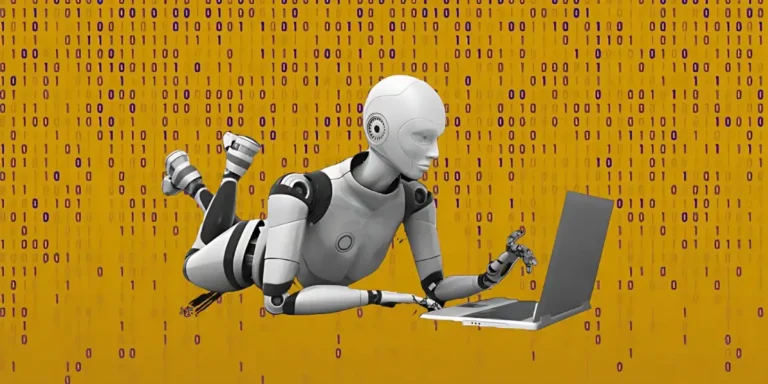The publishing industry is experiencing a digital revolution. With advanced algorithms and machine learning, computers are becoming more adept at performing tasks traditionally reserved for human editors.
But will AI completely replace book editors? In this blog post, we’ll examine the following criteria:
- The proper way to Use AI in book editing for maximum Effectiveness
- How does AI impact the work of book editor
- Impacts of AI on the book editor job industry
- Skills Do Human Book Editors Possess That AI Lacks and the Limitation of AI in book editing?
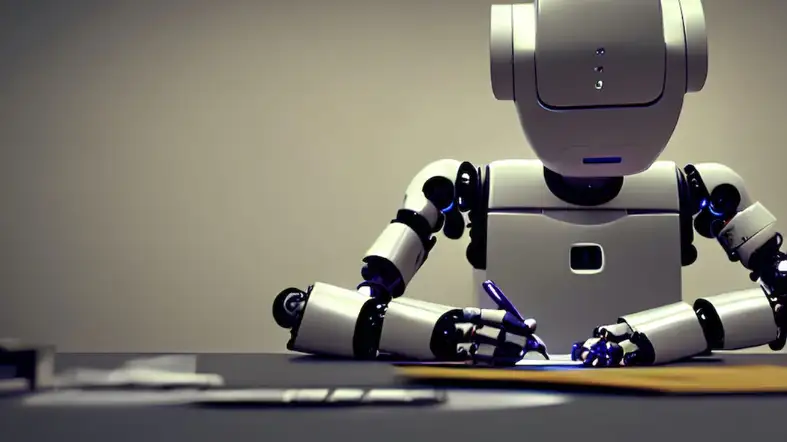
Will AI Replace Book Editors?
No, AI is unlikely to replace book editors entirely. AI can assist with technical editing but cannot make subjective decisions about style and content. Book editors provide more than just editing and work closely with authors.
AI can be useful in identifying repetitive language and grammatical errors and analyzing market trends, but human editors are still needed for the creative and subjective aspects of editing.
How Can The Use Of AI In Book Editing Be Optimized For Maximum Effectiveness?
Choosing the Right AI Tool for Book Editing
Several AI tools are available for book editing, including Grammarly, ProWritingAid, and Hemingway Editor.
The proper instrument must be chosen for your particular needs because each of these tools has distinct advantages and disadvantages.
For instance, Grammarly excels at detecting grammatical errors, while Hemingway Editor can help improve the clarity and readability of your writing.
It is crucial to evaluate the capabilities of each tool and match them to your editing requirements.
Training the AI Tool to Understand Your Writing Style: Customizing the Process
An AI tool can be trained to understand your writing style, ensuring that it provides suggestions that align with your writing style.
The training process involves feeding the tool with a significant amount of your writing data.
The more data the tool has, the better it can understand your writing style.
By customizing the AI tool to your writing style, you can enhance the accuracy of its suggestions and improve the quality of your book.
Using AI to Detect Grammar and Spelling Errors: Ensuring Quality
One of the most significant benefits of using AI in book editing is its ability to detect grammar and spelling errors.
AI tools can identify common errors such as subject-verb agreement, misplaced modifiers, and spelling mistakes, ensuring that your book is error-free.
This process enhances the overall quality of your writing and reduces the likelihood of distracting errors that may compromise your book’s readability.
Using AI to Improve Sentence Structure: Enhancing Readability
AI tools can suggest improvements to sentence structure, including identifying run-on sentences, sentence fragments, and passive voice.
Improving sentence structure can make your book more readable and enjoyable for your readers.
Using AI to Identify Repetitive Phrases and Words: Improving Flow
AI tools can identify repetitive phrases and words that can be distracting to readers.
By identifying these patterns, the tool can suggest alternatives that improve the flow of your writing.
This process ensures that your writing is engaging and retains readers’ attention, leading to a better experience for your audience.
Using AI to Improve Clarity and Readability: Making Your Writing Accessible
AI tools can improve the clarity and readability of your writing by suggesting simpler words and shorter sentences.
Additionally, AI can identify complex or confusing passages that can be revised for better comprehension.
This process ensures that your book is accessible to a broader audience, allowing more people to appreciate your work.
How Does AI Technology Impact The Work Of Book Editors?

Automated Proofreading
One of the most significant ways that AI technology impacts book editors’ work is through automated proofreading.
Instead of manually combing through a manuscript for errors and inconsistencies, editors can use AI-powered tools to catch mistakes quickly and efficiently.
For instance, Grammarly is an AI-powered writing assistant that can scan a document for grammatical, spelling, and punctuation errors.
Similarly, ProWritingAid is another tool to analyze writing for grammar, style, and readability issues.
These tools allow book editors to focus on higher-level editing tasks, such as evaluating the structure of a manuscript and ensuring that the narrative flows smoothly.
AI-Based Editing Suggestions
AI technology can also provide book editors with suggestions for improving the quality of a manuscript.
For example, some AI-powered tools can analyze the structure of a sentence and suggest alternative phrasing that might be more effective.
Additionally, some AI tools can analyze a manuscript for repetitive language, passive voice, and other shared writing mistakes.
These suggestions can help editors provide more comprehensive feedback to authors and ultimately improve the quality of the final product.
Automated Fact-Checking
Another way that AI technology impacts book editors’ work is through automated fact-checking.
The vast volume of online information makes fact-checking for editors time-consuming and difficult.
However, AI-powered tools can help streamline the process by scanning a manuscript for potential inaccuracies.
For example, Full Fact is a fact-checking tool that can analyze claims made in a manuscript and provide information on their accuracy.
This tool can help editors quickly identify any potential inaccuracies and provide feedback to authors.
AI-Based Content Curation
AI technology can also help book editors curate content for their readers.
For example, some AI-powered tools can analyze reader data to determine which topics are most popular and which articles generate the most engagement.
Using this data, book editors can decide which books to commission, which topics to cover in their publications, and how to package content to maximize engagement.
What Impact Could AI Have On The Job Market For Book Editors?
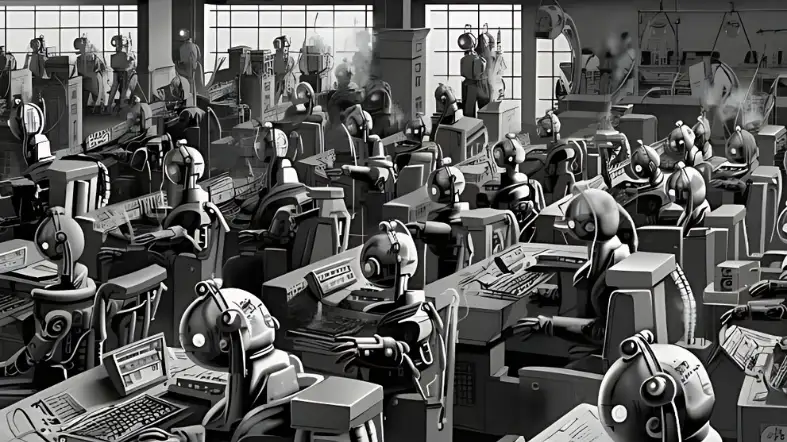
Automation of Repetitive Tasks
The automation of repetitive work is one of AI’s biggest effects on the labor market.
Numerous repetitive jobs, like data input and customer care, are susceptible to automation by AI.
Because a large portion of their labor includes repetitive duties like checking for grammar mistakes and ensuring uniformity in writing style, book editors may also be at risk of losing their employment to AI.
Writing Assistance
A writing aid is another effect of AI on the market for book editors. AI may assist authors in a variety of ways, including by making suggestions for sentence structure and correct grammar and spelling.
This support can be helpful for authors who desire to develop their writing abilities and create high-quality work without a book editor’s help.
However, because authors may rely more on AI than on human editors to polish their work, it can also result in a decline in the demand for book editors.
What Skills Do Human Book Editors Possess That AI Lacks?
Emotional intelligence
Human book editors have emotional intelligence, which is the ability to recognize and manage their own emotions, as well as understand and influence the emotions of others.
This is an essential skill for book editing because it allows the editor to understand the author’s vision and intent and make suggestions that align with the author’s goals.
Emotional intelligence also helps the editor to build a strong working relationship with the author, which can be important for ongoing collaboration and success.
Conversely, AI lacks emotional intelligence and cannot interpret the author’s emotions or intentions when making editing suggestions.
Critical thinking
Critical thinking is another skill that human book editors possess. This involves analyzing information and arguments, making objective judgments, and clearly understanding complex concepts.
Book editors must be able to identify flaws in an author’s arguments or writing style and suggest changes that will improve the book’s quality.
This requires a deep understanding of the subject matter and an ability to think creatively and come up with innovative solutions.
While AI can identify errors in spelling and grammar, it lacks the critical thinking skills needed to evaluate an author’s work nuancedly.
Creativity
Creativity is another essential skill that human book editors possess. While AI can produce technically correct writing, it cannot generate new and innovative ideas or develop a unique voice.
Human editors are able to look at an author’s work and suggest creative changes that will make it more engaging, thought-provoking, and original.
This requires a deep understanding of the author’s style, subject matter, and audience and a willingness to take risks and try new things.
Flexibility
Flexibility is also an important skill for book editors. As they work with different authors, genres, and subject matter, they must be able to adapt their editing style to fit the unique needs of each project.
They must also be able to accept feedback and make changes to their editing approach as needed.
AI lacks this flexibility and can only operate within the parameters of its programming.
Communication
Finally, communication is a critical skill for human book editors. They must be able to communicate effectively with authors, publishers, and other professionals in the industry.
This includes listening actively, providing constructive feedback, and building strong working relationships.
AI lacks the ability to communicate nuancedly and cannot build relationships in the same way humans can.
What Are The Limitations Of AI In Book Editing?
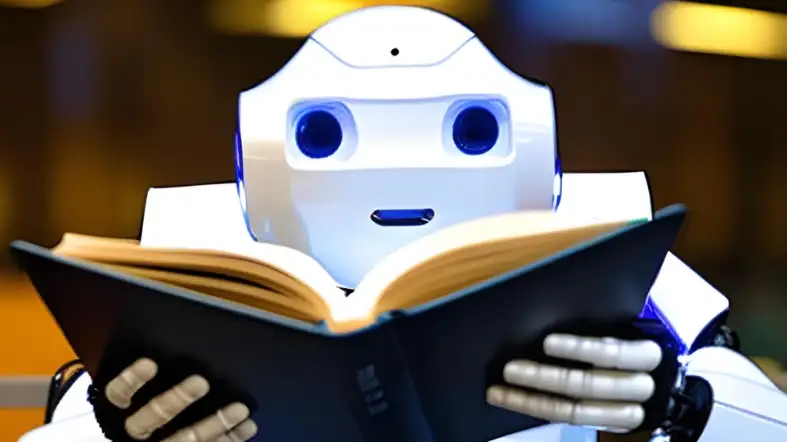
Limited Contextual Understanding
One of the significant limitations of AI in book editing is its limited contextual understanding.
While AI can detect grammatical errors and spelling mistakes, it struggles to comprehend the content’s context.
This means that it may miss important nuances in the text that a human editor would easily spot.
For example, if a sentence uses a word with multiple meanings, AI may choose the wrong meaning and make incorrect suggestions.
Human editors can quickly identify these types of errors because they better understand the context and can make the appropriate changes.
Inability to Account for Creative Writing Styles
AI algorithms are designed to follow specific rules and patterns, making them unable to account for authors’ various creative writing styles.
This limitation means that an AI-powered editing tool may miss the author’s intended tone, voice, or stylistic choices, leading to a lack of consistency in the final product.
For instance, a writer may use informal language to create a conversational tone in their book.
However, an AI-powered editing tool may flag such language as incorrect, losing the intended tone and style.
Limited Emotion Recognition
Another limitation of AI in book editing is its inability to recognize emotions in writing.
When editing, human editors can detect emotions like sarcasm, humor, or irony and make changes that maintain the author’s intended tone.
However, AI algorithms cannot accurately identify these emotions, leading to inappropriate suggestions.
For instance, an AI-powered editing tool may flag a sarcastic statement as incorrect, leading to unnecessary changes that affect the author’s intended meaning.
Lack of Subjectivity
Book editing involves a certain degree of subjectivity. An editor’s experience, preferences, and personal opinions influence their decisions.
However, AI-powered editing tools lack this subjectivity and are designed to follow specific rules and algorithms.
This lack of subjectivity means that an AI-powered editing tool may make changes that a human editor would not have made, leading to losing the author’s voice and style.
FAQs
Can AI Replace Human Book Editors Completely?
While AI can perform some tasks that human editors do, such as grammar and spelling checks, it cannot replace them entirely.
Book editors do more than just correct mistakes; they provide valuable insights into a book’s content, structure, and tone, which requires human intuition and expertise.
What Are Some Of The Advantages Of Using AI In Book Editing?
AI can help speed up editing by identifying errors and inconsistencies more quickly than human editors.
It can also provide data-driven insights into the marketability of a book, such as predicting its potential sales.
How Can AI And Human Editors Work Together?
AI can be a valuable tool for human editors, providing them with data-driven insights and analysis to help inform their decision-making.
For example, AI can help identify patterns and trends in reader preferences, which can help guide editorial choices.
Will AI Eventually Replace Book Editors Altogether?
While it’s possible that AI may become more sophisticated and capable of performing more editorial tasks, it’s unlikely that it will completely replace human editors.
There will always be a need for human intuition and creativity in the book publishing industry.
What Are Some Of The Ethical Considerations For Using AI In Book Editing?
As with any technology, there are ethical considerations to be aware of when using AI in book editing.
For example, there may be concerns about bias in the algorithms used by AI systems, which could affect the diversity and representation of authors and content.
Additionally, privacy concerns may be related to using data collected by AI systems.
Conclusion
While AI is becoming increasingly advanced, it is unlikely to replace book editors completely.
The role of a human editor involves not only correcting grammar and spelling errors but also understanding the nuances of language and the intentions of the author.
AI may be able to assist editors in some ways, but it cannot replace the human touch and creativity that a skilled editor brings to the table.
So, for now, we can rest easy knowing that the art of editing is safe in human hands.



